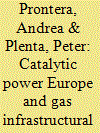|
|
|
Sort Order |
|
|
|
Items / Page
|
|
|
|
|
|
|
| Srl | Item |
| 1 |
ID:
171444


|
|
|
|
|
| Summary/Abstract |
By focusing on the natural gas sector and infrastructural policy in the Visegrad countries this article aims to reassess the EU's role in energy security governance. It argues that the EU can be conceptualised as a catalytic state rather than a regulatory state. It develops the notion of Catalytic Power Europe to highlight the specific type of power that the EU (as a catalytic state) can deploy to achieve its objectives. Catalytic Power Europe differs from existing conceptions of Regulatory and Market Power Europe. It relies on nodality and treasury rather than authority and on mechanism of connectivity and mobilisation rather than enforcement. It highlights the role of the European Commission as a facilitator and coalition builder rather than a regulator and market builder as in the regulatory state perspective. This role is illustrated by analysing the major gas interconnector projects and liquefied natural gas importing terminal that are under development in the V4 and that can affect their energy security. Catalytic Power Europe influences the V4 inter-group dynamics reducing the scope for uncoordinated and unilateral strategies. In this way, it also affects the prospect of EU-Russia energy relations undermining Moscow's divide et impera strategies in the region.
|
|
|
|
|
|
|
|
|
|
|
|
|
|
|
|
| 2 |
ID:
160747


|
|
|
|
|
| Summary/Abstract |
The V4 or Visegrad countries — the Czech Republic, Hungary, Poland, and Slovakia — have turned to the West for many reasons, including in order to advance technologically and economically, for political and administrative models, as well to gain military and political protection. The V4 countries are aware that their active and successful engagements within NATO and the EU are only possible in close cooperation with Germany. The V4 countries and Germany have had many opportunities to develop their mutual cooperation in the sphere of defense. However, defense cooperation seems to be underdeveloped within the forum of the V4 states as well as with Germany. The V4 platform clearly remains an unattractive tool for German military cooperation with Central European countries and has shown very limited potential even for its members. Germany does not have high expectations for the V4 alliance in terms of relevance as a security institution.
|
|
|
|
|
|
|
|
|
|
|
|
|
|
|
|
| 3 |
ID:
190850


|
|
|
|
|
| Summary/Abstract |
The article describes the process of norm localisation in the security sector by analysing the context, format and functions of national security strategies published by the Visegrád countries between 1990 and 2020. After the end of the cold war, the “Europeanisation” of the security policy of Central European took place, which included the publication of Western-style national security strategies. Nevertheless, due to national and regional particularities, such documents serve specific political and communication functions, signifying that Visegrád states localised the practice of issuing national security strategies instead of merely copying them. This process led to the diminishing practical value of such documents at the expense of their communication role in terms of belonging and hedging. The article tracks these developments through the three waves of Central European national security strategies between 1990 and 2020 through the analysis of their political context, aims and specific attributes based on various criteria. Results of the research indicate that the functions of national security strategies varied in different stages of the norm localisation process, which questions the traditional method of comparing explicit strategies through content analysis.
|
|
|
|
|
|
|
|
|
|
|
|
|
|
|
|
| 4 |
ID:
178617


|
|
|
|
|
| Summary/Abstract |
During the last decade, more than before, Germany has been pushed to take increasing responsibility for international affairs, including security, and move into a leadership position. Visegrad countries – the Czech Republic, Hungary, Poland and Slovakia – seem to be proper partners to follow German leadership as they are economically and in most cases politically tied to Germany. However, in recent years several discrepancies in the fields of soft as well as hard security have appeared between Germany and the Visegrad countries – most prominently the refugee crisis, Energiewende and the strengthening of collective defence military capacities on NATO’s eastern flank – substantially affecting the Visegrad countries’ readiness to be led by Germany. Having explored three policy areas where contestation appeared – migration policy, energy policy and the policy of NATO’s deterrence in Eastern Europe – we conclude that rather than as aleader, Germany is perceived as a source of unilateral pressure in Central Europe.
|
|
|
|
|
|
|
|
|
|
|
|
|
|
|
|
|
|
|
|
|